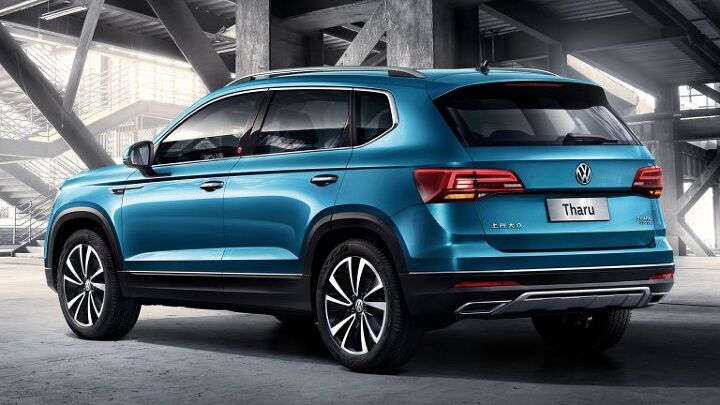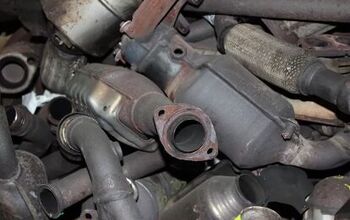Inbound From Mexico: Volkswagen's Tarek/Tharu Crossover Will Eventually Make It Here

Since supplies of Volkswagen’s held-over Tiguan Limited dried up last year, the brand hasn’t has a truly entry-level crossover with which to tempt cash-strapped Americans in need of both German heritage and cargo capacity.
A new small CUV initially planned for just North American buyers quickly became a global effort, as VW couldn’t gamble its future on EVs alone. It needs light trucks to fuel profit as it dumps cash into electrification. This North American model is now revealed to be a vehicle that debuted in China last October, and will make its way to U.S. by way of Mexico.
According to Autoblog Argentina, that country’s Pacheco plant will begin manufacturing the MQB-platform compact crossover for the Latin American market in 2021, once the assembly line bits arrive from the automaker’s SAIC Volkswagen joint venture. In Argentina, the company calls the effort the “Tarek Project.” China calls this vehicle the Tharu.
China will handle production for that market starting this year, while a Russian facility will crank out the new CUV for buyers in the Motherland. Europe, which already has the small T-Roc and slightly larger T-Cross CUVs, is not in need of another small vee-dub. Mexico is, however, and it’s in that plant where we’ll see U.S.-bound production occur. Expect to see a different name in this region.
Looking like a downsized Atlas with a strong character line sweeping from headlight to tail lamp, the Tarek/Tharu is roughly 10 inches shorter than the lengthy Tiguan that bowed for 2018. With its distinctly German looks, it should fill the gap left by the older-generation Tiguan Limited, which VW sold alongside the second-gen Tiguan for one model year. We’d be shocked it it didn’t appear with a turbocharged 2.0-liter/eight-speed auto combo, though VW’s turbo 1.4-liter could find use in lower-tier trims.
As declining volume makes itself felt at HQs the world over, Volkswagen is bucking the trend. The brand’s U.S. sales rose 4.2 percent in 2018, with the first four months of 2019 showing a 3.9 percent volume increase. By far, the Tiguan remains the brand’s best seller. With two models on offer for 2018, the Tiguan family’s sales rose 119 percent last year. Even with remaining stock of Tiguan Limiteds dwindling to nothing, Tiguan sales climbed 3.2 percent through April.
[Images: Volkswagen]

More by Steph Willems
Latest Car Reviews
Read moreLatest Product Reviews
Read moreRecent Comments
- ToolGuy I watched the video. Not sure those are real people.
- ToolGuy "This car does mean a lot to me, so I care more about it going to a good home than I do about the final sale price."• This is exactly what my new vehicle dealership says.
- Redapple2 4 Keys to a Safe, Modern, Prosperous Society1 Cheap Energy2 Meritocracy. The best person gets the job. Regardless.3 Free Speech. Fair and strong press.4 Law and Order. Do a crime. Get punished.One large group is damaging the above 4. The other party holds them as key. You are Iran or Zimbabwe without them.
- Alan Where's Earnest? TX? NM? AR? Must be a new Tesla plant the Earnest plant.
- Alan Change will occur and a sloppy transition to a more environmentally friendly society will occur. There will be plenty of screaming and kicking in the process.I don't know why certain individuals keep on touting that what is put forward will occur. It's all talk and BS, but the transition will occur eventually.This conversation is no different to union demands, does the union always get what they want, or a portion of their demands? Green ideas will be put forward to discuss and debate and an outcome will be had.Hydrogen is the only logical form of renewable energy to power transport in the future. Why? Like oil the materials to manufacture batteries is limited.



































Comments
Join the conversation
"To tempt cash-strapped Americans in need of both German heritage and cargo capacity." I am trying to imagine such a person...not having much luck. The cash strapped Americans who need cargo capacity I know are smart enough to buy a used Kia or ex-Hertz Caravan.
So Europe gets the more interesting T-Roc and we get something that looks like a boring shrunken Tiguan, which itself looks like a boring shrunken Atlas.